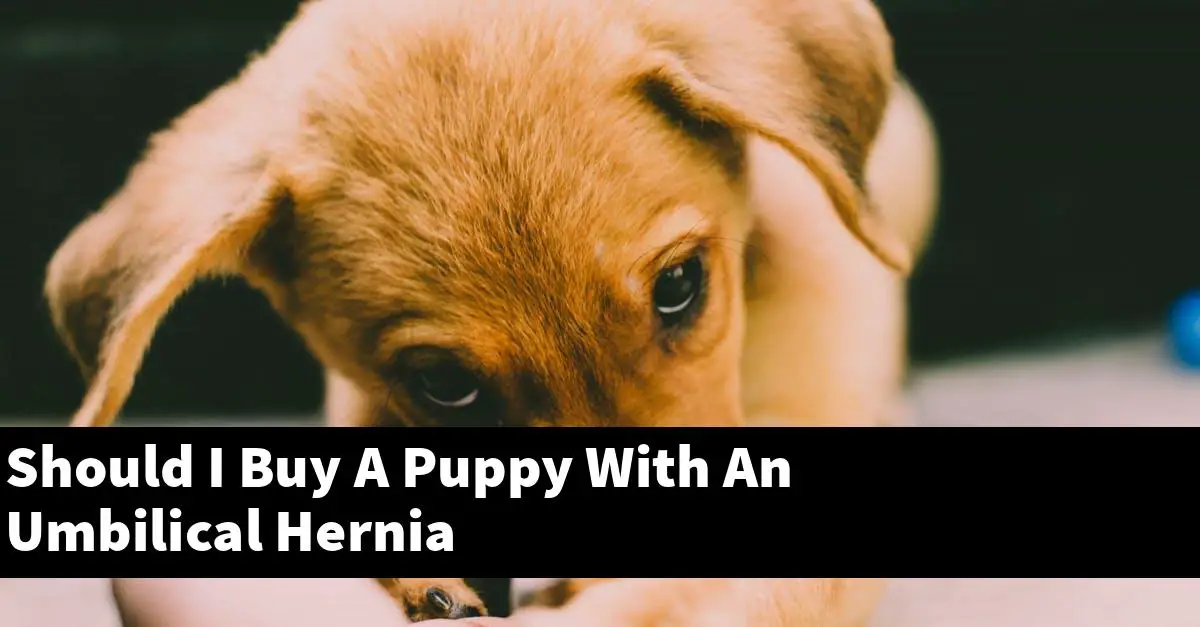An umbilical hernia is a protrusion of abdominal contents through an opening in the abdominal muscles. They are most common in newborns and usually close on their own within the first year. However, some may require surgery. If you are considering purchasing a puppy with an umbilical hernia, you should consult with a veterinarian to determine if surgery is necessary.
The article will cover the pros and cons of buying a puppy with an umbilical hernia.
Table of Contents
Is it safe to buy a puppy with an umbilical hernia?
An umbilical hernia is a relatively common birth defect in dogs. It occurs when a portion of the intestines protrudes through a hole in the abdominal wall near the navel. This can happen when the abdominal muscles are not properly developed, allowing the intestines to push through. In some cases, the hernia may be small and may not cause any problems. However, in other cases, the hernia can be large and can cause serious health problems.
If you are considering buying a puppy with an umbilical hernia, it is important to talk to your veterinarian first. There are several things that your vet will want to consider, including the size of the hernia, the location of the hernia, and whether or not the hernia is causing any problems. In some cases, surgery may be necessary to correct the problem. In other cases, the hernia may not need to be treated and may eventually go away on its own.
It is also important to consider the long-term health of the puppy. Dogs with umbilical hernias are more likely to develop other health problems later in life, such as gastrointestinal problems or hernias in other parts of the body. If you are concerned about the health of your puppy, be sure to talk to your veterinarian about your concerns.
How common are umbilical hernias in puppies?
A hernia is the protrusion of an organ or tissue through the wall of the cavity in which it is normally contained. An umbilical hernia is a hernia that occurs when a portion of the intestines protrudes through a weakness in the abdominal wall near the navel.
Umbilical hernias are relatively common in puppies. They are most often seen in breeds with short noses, such as Bulldogs, Pugs, and Boston Terriers. Puppies with umbilical hernias are born with the condition, and it is not usually painful.
If the hernia is small, it may close on its own as the puppy grows. However, if the hernia is large, it will require surgical correction. Surgery is typically performed when the puppy is between 4 and 6 months old.
Should I be worried about an umbilical hernia if my puppy has one?
If your puppy has an umbilical hernia, you may be wondering if you need to be worried. An umbilical hernia is a relatively common condition in puppies, and usually doesn’t require any treatment. However, in some cases, umbilical hernias can lead to serious health problems, so it’s important to be aware of the potential risks.
Umbilical hernias occur when a portion of the intestines protrudes through a weak spot in the abdominal wall near the umbilicus (belly button). They are most common in puppies that are born via cesarean section, and are also seen more often in smaller breeds.
Most umbilical hernias are small and cause no symptoms. However, if the hernia is large, it can cause the puppy to have difficulty urinating or defecating. In some cases, the hernia can become strangulated, which means the blood supply to the intestines is cut off. This is a very serious condition that can be fatal if not treated immediately.
If your puppy has an umbilical hernia, it’s important to watch for any signs of distress. If you notice your puppy is having difficulty urinating or defecating, or if the hernia appears to be getting larger, you should take them to the vet right away. In most cases, umbilical hernias can be safely monitored at home, but it’s always best to err on the side of caution.
What is the best way to treat an umbilical hernia in a puppy?
The best way to treat an umbilical hernia in a puppy is to have the puppy examined by a veterinarian. If the hernia is small, the veterinarian may recommend leaving it alone. If the hernia is large, the veterinarian may recommend surgery to close the hole in the abdominal wall.
Should I adopt a puppy with a hernia?
There are a few things to consider before adopting a puppy with a hernia. First, hernias can be genetic and passed down to future generations, so it’s important to do your research and make sure you’re comfortable with the risks. Second, hernias can be expensive to treat, so you’ll need to be prepared to cover those costs. Finally, hernias can be painful for dogs, so you’ll need to be sure you’re prepared to provide the necessary care and support. If you’re comfortable with all of these things, then adopting a puppy with a hernia can be a great experience.
How serious is an umbilical hernia in a puppy?
An umbilical hernia in a puppy is a serious condition that needs to be treated by a veterinarian as soon as possible. If left untreated, an umbilical hernia can lead to life-threatening health problems for your puppy. An umbilical hernia occurs when a portion of the intestines protrudes through a hole in the abdominal wall near the umbilicus (belly button). This can happen if the muscles in the area are weak or there is a congenital defect in the abdominal wall. Puppies with umbilical hernias are at risk for intestinal strangulation, which is when the intestines become twisted and cut off from the blood supply. This is a very serious condition that can be fatal. If you think your puppy has an umbilical hernia, you should take them to the vet right away.
What should I do if my puppy has an umbilical hernia?
If your puppy has an umbilical hernia, you should take them to the vet as soon as possible. Umbilical hernias are a common birth defect in dogs, and while they may not cause any immediate problems, they can become enlarged and cause serious health problems later in life.
Your vet will likely recommend surgery to repair the hernia. The surgery is fairly simple and is usually successful in correcting the problem. Recovery time is typically quick, and most puppies are able to return to their normal activities within a few days.
How much does it cost to fix an umbilical hernia on a puppy?
Umbilical hernias are common in puppies and usually occur when the puppy’s abdominal muscles do not close properly around the umbilical cord. This can happen either before or after birth. If the hernia is small, it may not need to be treated. However, if the hernia is large or if it becomes strangulated (meaning the blood supply to the hernia is cut off), it will need to be surgically repaired. The cost of surgery will depend on the veterinarian performing the surgery, the location of the surgery, and the severity of the hernia.
Summary
:
If you are considering purchasing a puppy with an umbilical hernia, you should consult with a veterinarian to determine if surgery is necessary. Dogs with umbilical hernias are more likely to develop other health problems later in life, so it’s important to be aware of the potential risks. Most umbilical hernias are small and cause no symptoms, but if the hernia is large, it can cause the puppy to have difficulty urinating or defecating. In most cases, umbilical hernias can be safely monitored at home, but it’s always best to err on the side of caution. If your puppy has an umbilical hernia, you should take them to the vet as soon as possible.


